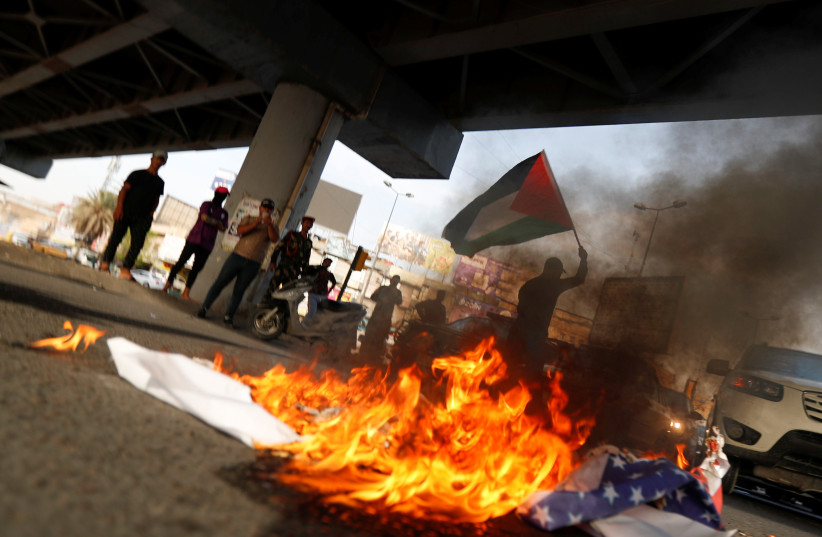Kidnapping in Iraq shows dangers of Iran-backed Kataib Hezbollah – analysis
The kidnapping in Baghdad of researcher Elizabeth Tsurkov, showcases the threat that Iranian-backed militias, particularly Kataib Hezbollah, pose in Iraq and the region.
Kataib Hezbollah has long been involved in threats against US forces in Iraq, as well as threats against Saudi Arabia and other countries. In the past it established a network in Syria and is part of the wider Iranian-backed octopus of groups that are linked to Hezbollah and the Islamic Revolutionary Guard Corps.
Kataib Hezbollah was founded in the first decade of the 2000s and was well known for threats to US forces after the US invasion in 2003. Abu Mahdi al-Muhandis, the leader of the group was one of those sanctioned by the US Department of the Treasury.
In 2009 they noted that “Al-Muhandis and Kata’ib Hizballah have committed, directed, supported, or posed a significant risk of committing acts of violence against Coalition and Iraqi Security Forces…Abu Mahdi al-Muhandis is an advisor to Qasem Soleimani, the commander of Iran’s Qods Force, the arm of the Islamic Revolutionary Guard Corps (IRGC) responsible for providing material support to Lebanon-based Hizballah, Hamas, Palestinian Islamic Jihad, and the Popular Front for the Liberation of Palestine – General Command. Further, the IRGC-Qods Force provides lethal support to Kata’ib Hizballah and other Iraqi Shia militia groups who target and kill Coalition and Iraqi Security Forces.”
Muhandis had been wanted since the 1980s for his role in bombings in Kuwait. Kataib Hezbollah was known for rocket and explosive IED attacks targeting US forces.
 Members of Kataib Hezbollah paramilitary group burn Israeli and U.S. flags ahead of the annual Quds Day, or Jerusalem Day, during the Muslim holy month of Ramadan in Baghdad, Iraq May 6, 2021. (credit: THAIER AL-SUDANI/REUTERS)
Members of Kataib Hezbollah paramilitary group burn Israeli and U.S. flags ahead of the annual Quds Day, or Jerusalem Day, during the Muslim holy month of Ramadan in Baghdad, Iraq May 6, 2021. (credit: THAIER AL-SUDANI/REUTERS)The long term consequences of the United States withdrawing from Iraw
After the US withdrew from Iraq the Iranian-backed groups such as Kataib Hezbollah and the Badr Organization flourished under the pro-Iranian prime minister of Iraq Nouri al-Maliki. His misrule in Iraq and antagonism against Sunni Arabs and Kurds helped fueled resentment.
ISIS tapped into that resentment in 2014 when it invaded Iraqi cities such as Mosul. As such, groups like Kataib Hezbollah hollowed out Iraq and weakened it in the face of extremism. Kataib Hezbollah then benefited after the ISIS invasion because Iraqi cleric Ayatollah Sistani issued a fatwa, calling Iraqis to arms to fight. It exploited this chaos to increase its power in Iraq.
After 2014, Kataib Hezbollah and its allies were able to infiltrate the Iraqi interior ministry, federal police and other areas of the country claiming to be fighting ISIS under the banner of the Popular Mobilization Units formed by the fatwa. After 2017 these groups became institutionalized and received a government payroll as official paramilitaries. They then began targeting US forces to get the US to withdraw and they attacked the Kurdistan autonomous region in 2017. In January 2020, after attacks on US forces and the US Embassy the US killed Soleimani and Muhandis in a drone strike in Baghdad.
However that killing has only been a temporary setback. Kataib Hezbollah has also tried to infiltrate Syria’s Albukamal to help Iran move weapons to Hezbollah in Lebanon.
Kataib Hezbollah was likely behind the assassination of Iraqi researcher Hisham al-Hashimi in July 2020 and also involved in attacks against Iraqi Prime Minister Mustafa al-Kadhimi. Iraqi security forces sometimes tried to crack down on these Iranian-backed groups. For instance in June 2020 fourteen members of Kataib Hezbollah were detained and then released. Kataib Hezbollah switched to using drones to threaten US forces in Iraq and target dissidents.
Iraqi courts have sometimes tried to confront the group. Arab News noted recently in May that an “Iraqi court this month handed down a death sentence to a former policeman who was convicted of killing prominent academic Hisham Al-Hashimi in a shooting that took place in July 2020, near the victim’s house in the capital Baghdad.
The convict, Ahmed Ouaid Al-Kinani, a police officer employed by the Iraqi Ministry of Interior, confessed to killing Al-Hashimi in July 2021 in video footage aired on an Iraqi television channel.
Al-Kinani’s affiliation with the Ministry of Interior came as a shock to many but, more importantly, he was a member of Kata’ib Hezbollah, one of the country’s most radical militias and a Popular Mobilization Units faction.” This illustrates how the group has threatened Iraq’s security. It’s links with Iran’s IRGC mean that it also has a network that extends to Iran and Syria and onward to Hezbollah in Lebanon.





Comments are closed.